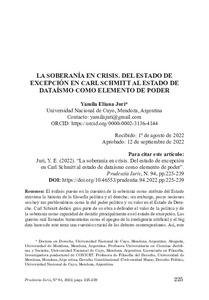Por favor, use este identificador para citar o enlazar este ítem:
https://repositorio.uca.edu.ar/handle/123456789/15638| Título: | La soberanía en crisis : del estado de excepción en Carl Schmitt al estado de dataísmo como elemento de poder Sovereignty in crisis : from the state of exception in Carl Schmitt to the state of dataism as an element of power Sovranità in crisi : dallo stato di eccezione in Carl Schmitt allo stato di datità come elemento di potere |
Autor: | Juri, Yamila Eliana | Palabras clave: | Schmitt, Carl, 1888-1985; SOBERANIA; ESTADO; HISTORIA DEL DERECHO; INTELIGENCIA ARTIFICIAL; BIG DATA | Fecha de publicación: | 2022 | Editorial: | Pontificia Universidad Católica Argentina. Facultad de Derecho | Cita: | Juri, Y. E. La soberanía en crisis : del estado de excepción en Carl Schmitt al estado de dataísmo como elemento de poder [en línea]. Prudentia Iuris. 2022, 94. doi: 10.46553/prudentia.94.2022.pp.225-239. Disponible en: https://repositorio.uca.edu.ar/handle/123456789/15638 | Resumen: | Resumen: El énfasis puesto en la cuestión de la soberanía como atributo del Estado atraviesa la historia de la filosofía política y el derecho; sin embargo, pocas nociones son hoy tan problemáticas como la del poder político y su valor en el Estado de Derecho. Carl Schmitt dedicó gran parte de su obra a defender el valor de la política y de la soberanía como capacidad de decidir principalmente en el estado de excepción. Las guerras mal llamadas humanitarias como el apogeo de la inteligencia artificial y el big data hacen de este tema una cuestión crucial de los debates contemporáneos. Así, este artículo reflexiona sobre la relación entre soberanía y conceptos claves de la teoría schmittiana como estado de excepción y teología política, pero en una perspectiva que desemboca en la soberanía de los datos (big data) como punto de fuga que hoy nos atraviesa de forma inminente. Abstract: The emphasis placed on the question of sovereignty as an attribute of the state runs through the history of political philosophy and law, but few notions are as problematic today as that of political power and its value in the rule of law. Carl Schmitt devoted much of his work to defending the value of politics and sovereignty as the capacity to decide mainly in the state of exception. The wars wrongly called humanitarian as the heyday of artificial intelligence and big data make this topic a crucial issue of contemporary debates. Thus, this article reflects on the relationship between sovereignty and key concepts of schmittian theory such as state of exception and political theology but in a perspective that leads to the sovereignty of data (big data) as a vanishing point that today crosses us imminently. Sommario: L’enfasi sulla questione della sovranità come attributo dello Stato attraversa la storia della filosofia politica e del diritto, ma poche nozioni sono oggi così problematiche come quella del potere politico e del suo valore nello Stato di diritto. Carl Schmitt ha dedicato gran parte della sua opera alla difesa del valore della politica e della sovranità come capacità di decidere, soprattutto nello stato di eccezione. Le cosiddette guerre umanitarie e il periodo di massimo splendore dell’intelligenza artificiale e dei big data ne fanno un tema cruciale nei dibattiti contemporanei. Questo articolo riflette quindi sul rapporto tra la sovranità e i concetti chiave della teoria schmittiana, come lo stato di eccezione e la teologia politica, ma in una prospettiva che porta alla sovranità dei dati (big data) come punto di fuga ormai imminente. |
URI: | https://repositorio.uca.edu.ar/handle/123456789/15638 | ISSN: | 2524-9525 (online) 0326-2774 (impreso) |
Disciplina: | DERECHO | DOI: | 10.46553/prudentia.94.2022.pp.225-239 | Derechos: | Acceso abierto | Fuente: | Prudentia Iuris. 2022, 94 |
| Aparece en las colecciones: | PI - 2022 nro. 94 |
Ficheros en este ítem:
| Fichero | Descripción | Tamaño | Formato | |
|---|---|---|---|---|
| soberanía-crisis-estado.pdf | 258,39 kB | Adobe PDF |  Visualizar/Abrir |
Visualizaciones de página(s)
51
comprobado en 27-abr-2024
Descarga(s)
207
comprobado en 27-abr-2024
Google ScholarTM
Ver en Google Scholar
Altmetric
Altmetric
Este ítem está sujeto a una Licencia Creative Commons

